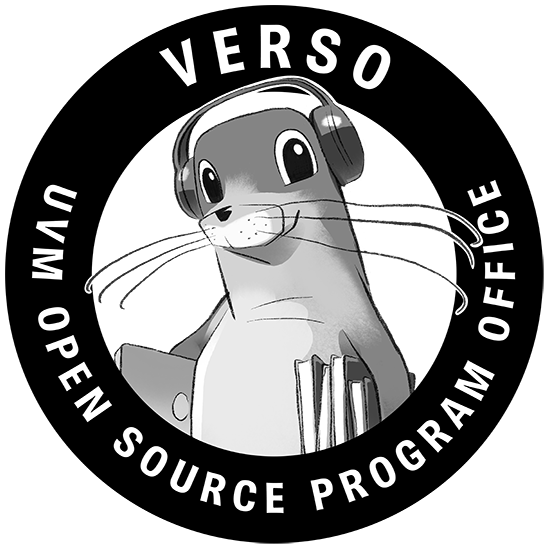At the Vermont Research Open Source Program Office (VERSO), we offer a range of programs designed to empower students, faculty, and community partners to engage with open-source innovation and research. These initiatives support collaboration, skill-building, and sustainable development through real-world projects aimed at solving critical challenges. Our key programs include the Open Research Community Accelerator (ORCA), the Open Source Connector, Open Research Community Student Club and access to the Open Resource Library.
Open Research Community Accelerator (ORCA)
https://verso.w3.uvm.edu/orca/
ORCA is a dynamic initiative that brings together interdisciplinary teams of students, researchers, and community partners to tackle pressing social, environmental, and technical challenges through open-source projects. Following Agile methodology, participants in ORCA work in sprints to develop solutions using open data and software.
ORCA participants gain hands-on experience with project management, stakeholder engagement, and technical development, all while contributing to impactful community-focused initiatives. Current projects include:
- Vermont Zoning Atlas: A comprehensive dataset that supports housing development and sustainability planning across the state.
- Wastewater Infrastructure Mapping: Identifying and documenting essential wastewater resources to support economic and community growth.
- Heard and Understood App: The Heard and Understood App provides a way to explore and classify silence and gaps in conversations.
Teams present their progress through demos and reports, ensuring transparency and real-world impact. ORCA is a space for innovation, learning, and community engagement, positioning open-source as a vehicle for positive change.
Open Source Connector
https://opensourceconnector.com/The Open Source Connector is a collaborative platform that fosters connections between open-source contributors at UVM and beyond. It serves as a bridge between researchers, developers, and community stakeholders who seek to build, share, and expand open-source solutions. The Connector helps:
- Facilitate Collaboration: Linking individuals and groups with shared interests in open-source projects.
- Provide Resources: Offering access to technical support, version control systems, and open-source tools.
- Organize Events: Hosting hackathons, workshops, and community meetups to strengthen the open-source community.
- Promote Projects: Elevating the visibility of UVM-driven open-source work to local and global audiences.
Whether you are a seasoned contributor or new to the world of open-source, the Open Source Connector provides the support and opportunities needed to grow your projects and contribute to a larger ecosystem of innovation.
Organizers
- Jean-Gabriel Young (Research Assistant Professor – UVM) Mathematics and Statistics at The University of Vermont, VT. His research is at the intersection of statistical inference and complex systems. He is part of the Open-Source Ecosystems and Networks (OCEAN) research group funded by Google Open Source.
- Kendall Fortney (Program Director – UVM) – Director of Open Source Program Office (VERSO) at UVM and organizer for the Burlington Data Scientists Meetup since 2016, Kendall has been active in community organizations and the local tech groups for over a decade.
- David Kopec (Associate Professor – Champlain College) Computer Science & Innovation, Division of Information Technology & Sciences at Champlain College is a CS educator, author, and open source contributor. David designed the course CSI 280 Innovation II Open Source Software Development about the history, philosophy, and tools of the open source movement. David is the author of four books on programming and computer science. Open source projects he leads are incorporated in many production apps.
- Jonathan Ferguson (Assistant Professor – Champlain College) Game Design and Game Production, Division of Communications and Creative Media at Champlain College is a software freedom advocate. Prof. Ferguson has been the Faculty Advisor for the project-based Free and Open Source Technology club at Champlain College since its founding in 2009. With over 27 years of technology experience, spanning careers in Cybersecurity, Software Development, Game Development, and Teaching, Prof. Ferguson maintains particular interests in free and open source software, game technology, game history and game preservation and access. Prof. Ferguson holds a Masters of Science in Managing Innovation in Information Technology from Champlain College.
Open Resource Library
The Open Resource Library is a valuable tool that provides access to a curated collection of open educational resources (OER), research materials, and data repositories. This platform serves as a comprehensive hub for researchers and educators looking to:
- Discover Open Resources: Access a wide range of open-source research materials, educational content, and tools.
- Share and Publish: Contribute your own work to the library, making it accessible to a broader community.
- Enhance Research and Learning: Leverage free and open content to support your academic or research projects.
The Open Resource Library promotes the sharing of knowledge and resources to accelerate research, learning, and innovation at UVM and beyond.
Open Research Community Student Club
GitHub Organization: https://github.com/Open-Research-Community
The Open Research Community (ORC) student club focuses on fostering a vibrant open-source community within our university, guided by the principles of the VERSO. As co-learners and co-developers, students will actively engage with key community stakeholders, partnering with the UVM Office of Engagement and Extension to address the real needs of the local community. By contributing to and utilizing open-source software produced through VERSO, the students aim to bridge the gap between academia and the broader community. The club will play a crucial role in promoting positive studies of open source within science, aiming to develop a diverse sample of scientific projects and their users.
